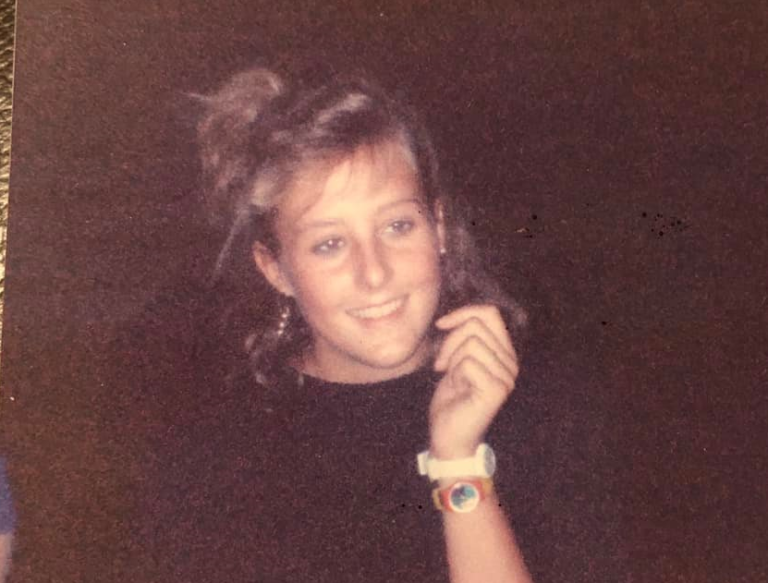
I was 14 when I first snuck into my parent’s liquor cabinet and poured some sort of brown alcohol into a hastily washed Aquanet bottle. I took it with me to a Friday night football game where my friends and I poured it into a Coke and shared it. Later, I pounded a few beers with some football players twice my size.
I was 15 the first time I smoked pot up on a hill behind my friend’s house after school one day. I didn’t feel much, but I remember pretending I did so the rest of the group wouldn’t think I was stupid. It didn’t stop me from doing it again (and again.)
My high school years were filled with dangerous, risky behavior.
I was also a cheerleader, honor roll student, Young Life member, peer counselor, and on the student council.
And sharing my past now makes my cheeks hot.
Although I turned out OK, after a youth spent pushing boundaries and limits, there are moments of my adolescence I’d like to forget. I was lucky that I stayed safe and that my bad choices didn’t follow me for the rest of my life, or worse, impact my parents.
I came from a solid home environment. My parents both worked, but they were loving and supportive. My mom enforced curfew and outright let me know when she didn’t like who I was hanging around at certain times. They were involved and we ate family meals and all the other things great parents do.
But I was that girl. I was the one who loved parties and socializing and trying new things. I had a healthy respect for my parents and their rules, but that never stopped me from drinking or carousing or sneaking out a few times in the middle of the night.
Just like doing those things never stopped me from getting good grades, holding a job, and somehow making it home by midnight almost every time I went out.
And here I sit, with three kids roughly the same age I was when I started making decisions that could have ended badly. So when my daughter said to me the other evening, “I wish you would trust me more,” I wondered if I should explain to her why I couldn’t.
Because I was one of the most trustworthy kids in my grade, yet I still made dangerous choices right under my parent’s noses.

I always wondered how much of my past I would share with my kids and when.
As parents, I think we all believe we are open and honest with our children, but the truth of it is, very few of us are.
And with good reason. It is hard to be vulnerable. We don’t want to put ideas in their heads. We don’t want them to think less of us.
But in a split-second decision, I shared my past with my daughter, warts and all. Her eyes got big. She shouted, “What? You?!” She laughed at some parts and looked fearful of others.
At the end, I told her, “I know you’re not me, but you need to know that I wasn’t perfect in high school. I wasn’t perfect after nor am I now. And you’re going to make mistakes, but that doesn’t mean they define who you will be when you grow up.”
And at that moment, the two of us were in this growing up thing a little bit more together than we were in the past.
For the first time, she asked me some questions about drinking and drugs. She asked me about boys I had dated. She wanted to know about the rules my parents put in place for me, and how I broke them.
We also talked about how I knew how today’s teens have it so much differently, so she knew I understood that important fact.
I explained how I was thinking a lot lately about how some things were the exact same as when I was a teenager, but some were so different, and not in a good way.
Teens today have to deal with a slew of things that I never thought about, such as:
- Social media
- Covid chaos
- Enormous competition to get into college (and high cost)
- More AP classes/academic rigor
- Active shooter drills
- The increased teen suicide rate amongst peers
- Killer drugs laced in everything
- Greater divide socially and politically
- Increased discussion about global warming/environmental issues, the world ending
- Negative news cycles pushed to their screens
I hear my three daughters talk about these issues all the time. That’s in addition to the normal teen stuff like peer pressure, bullying, dating, acne, drinking/drugs, etc.
I know my daughters are more stressed than I was, and it’s challenging to help them manage the anxiety they feel about the world around them.
So, I told her that these are also things that stress me out quite a bit as an adult, so I could only imagine how she must feel.
We can’t parent our kids the same as our parents did because it is a completely different time, and our kids face completely different issues, but that doesn’t mean we can’t show them we get it.
Sometimes, I’m a little softer on my kids than my parents were on me, and sometimes I may do a little bit more for my kids than what my parents did for me, and yes, sometimes I give them a little more grace.
It doesn’t make my teens lazy and entitled. It doesn’t mean they are soft. It doesn’t mean we are bad parents.
It means we’ve had to adjust to the world around us. It means as families, we are facing things others have never dealt with before, in addition to the things that I went through, too.
And it means that despite what my children go through, I want to ensure they feel safe and loved because we know the world is not making them feel that way, and we have no idea what is coming next. I think my mom felt that way too.
We are raising the first iGeneration. The first generation documented on social media. The first generation of kids who are so connected through YouTube and TikTok that bad influence flies across the country with a touch of a button.
We are raising the first generation of students participating in active shooter drills. The first where parents are encouraged to keep Narcan in their homes for potential fentanyl overdoses. The first generation whose every move is recorded by doorbells and cell phones and cameras at every juncture.
We are raising kids in unprecedented times. We are raising kids who are just like we were in high school and nothing like we were in high school.
So, like parents before us, we do the best we can with what we’ve got.
And we keep talking and trying to prepare our kids for whatever the world looks like.
I think I connected with my teen daughter that day, both about my past and her present.
I wanted her to understand that I remember what being a teenager was like, and that I was trying to understand what being a teenager today was like.
I also mentioned that having a mom who liked to party meant that I knew most of the tricks already, and if that I hadn’t used them, my friends had.
I was trying to trust her, but I would always be cautious.
Before this moment, I thought I was an open and honest parent with my kids, the truth is it was a one-way street. I wanted them to tell me things, but I wasn’t willing to be vulnerable with them.
It’s hard and scary and difficult to share your past with your kids. It’s hard to talk about the world around us.
We all want them to be better, to be bigger than our mistakes, to improve on our shortcomings.
But how can we expect them to be better if we don’t share with them how we learned from our past?
How can we expect them to do better if we don’t tell them how we did it ourselves?
I don’t know when the right time is to talk to our kids about our past. I don’t know if it is even right at all.
But I know that you can never have too many conversations with our teens.
And I can only hope that in those talks that one of them can make a difference.
*We love this book, Born to Be Wild, by Dr. Jess Shatkin. A groundbreaking, research-based guide that sheds new light on why young people make dangerous choices–and offers solutions that work

Texting while driving. Binge-drinking. Unprotected sex. There are plenty of reasons for parents to worry about getting a late-night call about their teen. But most of the advice parents and educators hear about teens is outdated and unscientific–and simply doesn’t work.
Acclaimed adolescent psychiatrist and educator Jess Shatkin brings more than two decades’ worth of research and clinical experience to the subject, along with cutting-edge findings from brain science, evolutionary psychology, game theory, and other disciplines — plus a widely curious mind and the perspective of a concerned dad himself. This is the blueprint into the teenage brain that parents need to understand them better.
Parenting teens and tweens is HARD. Make it a little easier with these popular posts other parents found helpful:
5 Essential Parenting Books Every Parent Of A Teenager Needs To Survive
This is Sixteen; When Everything Changes
How To Meet Our Teens; Need To Love and Be Loved Just As They Are
5 Simple Things You Need To Keep Doing When Kids Are Teens
*This post may contain affiliate links where Parenting Teens & Tweens earns a small commission from products purchased from our site.






This article “This is What I Share With my Teenager about My Wild High School Years” was so nice to read. I, too, have chosen to share about myself because I want my teen to know that he isn’t alone in the temptations, but also to maybe keep in mind my own experience to avoid trying it on his own. However, if he does, I also want him to feel safe in calling me or asking for help or talking to me before trying.
Thank you-I love this publication!